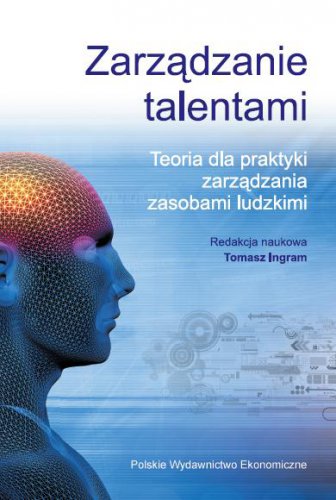Zarządzanie talentami. Teoria dla praktyki zarządzania zasobami ludzkimi
Publication date: 2011
Place publication: Warszawa
Publication: I
Binding: paperback
Format: 162x237
The end of the 20th and the beginning of the 21st centuries have been the golden era of human resources management – the most precious resources in any organization. Significantly increased interest in human resources management manifests itself in a large number of publications, whether of theoretical or practical profile.
Such new areas, discovered relatively recently, include management of the best, most talented employees — in this study referred to as talents.
Quite naturally, the study is based on several key theories or areas of knowledge. They include, in particular, resource-related theory of organization, the concept of strategic management, the issue of human resources management and that of strategic management of human resources. The sheer diversity of theoretical approaches to the problem of talent management stems from several significant premises: the lack of a reliable theoretical fundament in the area under consideration, an attempt at multi-faceted approach to the issue of talent management and, finally – a large number of authors and independent points of view. The starting point for reading the subsequent parts of the book is its chapter one, in which the key issues regarding definitions in the field of talent management are presented. Nonetheless, any subchapter may be read on its own. What they all have in common is the common structure, according to which theoretical issues are discussed first, then they are related to the findings of research (empirical or in literature), and finally the results of the analyses and considerations performed are presented, with emphasis put upon practical issues.
This study is going to provide theoreticians with inspiration and motivation to involve in empirical research in the field of talent management; to attract practitioners to a different point of view on the issues of management of what makes the most valuable resources for any organization; and it will encourage everybody to further and deeper reflection.
Spis treści
Wstęp (Tomasz Ingram)
Rozdział 1. Miejsce i znaczenie talentów we współczesnej organizacji (Tomasz Ingram)
1.1. Istota talentu
1.2. Talent na tle pojęć pokrewnych
1.3. Istota zarządzania talentami
1.3.1. Model C. Ashton i L. Morton
1.3.2. Model L.A. Berger i R.B. Berger
1.3.3. Model H. Bienioka
1.3.4. Model S. Borkowskiej
1.3.5. Model L. Burke
1.3.6. Model F.D. Franka i C.L. Taylora
1.3.7. Model J.S. Heinena i C. O’Neill
1.3.8. Model T. Listwana
1.3.9. Model R.T. Muchy
1.3.10. Model A. Pocztowskiego
1.3.11. Model J. Romansa, A. Frosta i S. Forda
1.4. Strategiczna perspektywa zarządzania talentami w organizacji
1.5. W kierunku syntezy, czyli kluczowe elementy zarządzania talentami w organizacji – wyzwanie dla zarządzania zasobami ludzkimi
Rozdział 2. Rekrutacja i selekcja talentów (Tomasz Ingram)
2.1. Specyfika pozyskiwania talentów
2.2. Tradycyjne i nowoczesne koncepcje pozyskiwania talentów
2.3. Rekrutacja i selekcja a trudności z pozyskaniem talentów w świetle wyników badań
2.3.1. Charakterystyka badań empirycznych
2.3.2. Zmienne i miary
2.3.3. Zależność pomiędzy politykami rekrutacji i selekcji a zdolnością organizacji do pozyskiwania wyjątkowych pracowników
2.4. Implikacje badań empirycznych dla rekrutacji i selekcji talentów
Rozdział 3. Wynagradzanie talentów (Magdalena Majowska)
3.1. Kształtowanie właściwej scenerii organizacyjnej
3.2. Ustalanie wysokości wynagrodzenia pracowników utalentowanych
3.3. Kryteria różnicowania wynagrodzeń talentów
3.4. Administrowanie wynagrodzeniami pracowników utalentowanych
3.5. Wnioski i implikacje dla praktyki
Rozdział 4. Szkolenie jako forma rozwoju pracowników utalentowanych (Justyna Musiał-Kondziela, Piotr Zabłocki)
4.1. Szkolenia i rozwój talentów
4.2. Specyfika talentów w procesie szkoleń
4.3. Nowoczesne formy szkolenia stosowane w rozwoju talentów
4.4. Studium przypadku szkolenia talentów
4.4.1. Charakterystyka firmy
4.4.2. Charakterystyka projektu
4.4.3. Identyfikacja i analiza potrzeb szkoleniowych
4.4.4. Przygotowanie i przeprowadzenie szkolenia
4.4.5. Ocena szkolenia
4.4.6. Podsumowanie
Rozdział 5. Specyfika zarządzania karierami talentów (Monika Rutkowska)
5.1. Transformacje w karierze – od liniowych do wielokierunkowych modeli karier
5.2. Zarządzanie karierą – perspektywa indywidualna vs. organizacyjna
5.3. Zarządzanie karierami talentów – programy rozwoju karier talentów
Rozdział 6. Problematyka oceniania pracowników utalentowanych (Tomasz Ingram)
6.1. Istota oceniania talentów
6.2. Metody ewaluacji pracy talentów
6.3. Propozycja metody pomiaru, identyfikacji i oceny talentu
6.4. Implikacje dla pomiaru i oceny talentów w organizacji
Rozdział 7. Rozstania z talentami (Janusz Strużyna)
7.1. Istota rozstań z talentami
7.2. Przyczyny rozstań z talentami
7.3. Zasady ułatwiające rozstania
Zakończenie (Tomasz Ingram)
Załącznik. Narzędzie do badania polityk rekrutacji i selekcji
Bibliografia
| Odbiór osobisty | 0 € |
| Inpost Paczkomaty | 4 € |
| Kurier Inpost | 4 € |
| Kurier FedEX | 4 € |
| Free delivery in Reader's Club | from 47 € |

